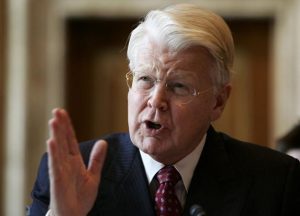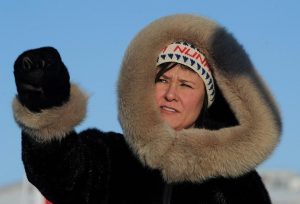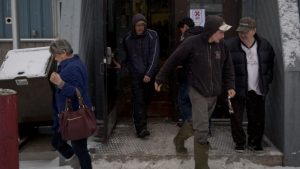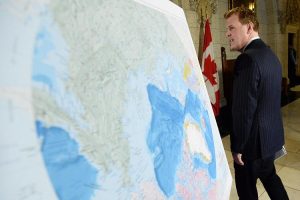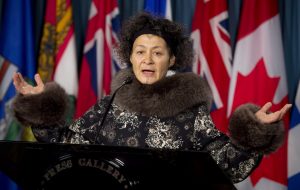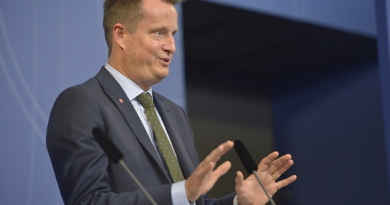Eye on the Arctic – 2013 Year in Review
2013 was another big year for Arctic news, especially in Canada.
Earlier this year, Canada took over chairmanship of the Arctic Council from Sweden. This put Canada and its northern policies in the spotlight like never before.
- But now that Canada is several months into its mandate, just how is it doing?
- What effect has its chairmanship had on Arctic politics both internationally and domestically?
- What role has Canada’s northern peoples, especially the Inuit, had on Canadian politics and policy in 2013?
To help us make sense of some of this year’s most important developments, Eye on the Arctic turned to Heather Exner-Pirot, editor of the Arctic Yearbook, a journal focused on northern security and geopolitics. She’s also one of Eye on the Arctic’s bloggers.
The Arctic Council
Eye on the Arctic: When you look back at the big Arctic stories of 2013, what stands out for you?
Heather Exner-Pirot: The political and international interest in the Arctic has been accumulating. But it really culminated this year at the Arctic Council ministerial when six new states; China, India, Japan, Korea, Singapore and Italy, were accepted as observers to the Arctic Council. They weren’t the first new observers. But it really marked this growing global and Asian interest in the Arctic. So that was a really big news item for 2013.
But the other thing that happened at the Arctic Council ministerial, and I don’t think it got enough publicity or attention, was that an Inuk, or Arctic resident, was named Chair for the first time. That was of course Canada’s Leona Aglukkaq.
Back in 1996 when the Arctic Council was set up indigenous peoples were invited to sit at the table. Finally, 16 or 17 years later, an Arctic indigenous person is at the head of the table.
Environment and development
Eye on the Arctic: Have you seen Arctic policy being reshaped in any way by Canada’s chairmanship?
Heather Exner-Pirot: I have not. I think Canada has been ambitious and tried to steer the Arctic council in a certain way. For the last 16 years, through the first cycle of chairmanships, there’s been a real focus on environmental protection. But it’s also supposed to do sustainable development. And it’s never really been successful or ambitious on that side.
Canada has tried to reshift the focus of the Arctic Council from an environmental focus to one on human development. But I can’t say that I’ve seen that Canada has been effective in pulling along everyone else to that kind of human and development side. There’s actually been criticism that it’s kind of a conservative platform to do economic development and resource exploitation. But I think the message is very important – that there’s people there, they need jobs, they want self-sufficiency.
We certainly see in Greenland and northern Alaska that people that live in the Arctic are looking for that kind of development.
Eye on the Arctic: There was also a new Arctic group formed this year (the Arctic Circle) and the president of Iceland was behind it. What did you notice as you were watching it?
Heather Exner-Pirot: It was a response to this perceived exclusivity of the Arctic Council. Alaskans, Greenlanders and Icleanders were especially prominent in organizing this to be a global forum about the Arctic and to become involved. I certainly think it achieved what it wanted to achieve. It had a global focus, and I don’t know that in Arctic politics, or the Arctic community, that we’ve done enough to really marry the regional and the local and the global into a cohesive policy direction.
Flags, claims and sovereignty
Eye on the Arctic: What were the overlooked Arctic stories or issues of 2013?
Heather Exner-Pirot: There’s a ton. Especially the New York Times has been terrible this year with Op-eds with a ‘Rush-to-the-Arctic’ kind of theme. But two stories do stand out which really demonstrated the cooperation that we’re actually seeing on the ground in the Arctic.
Canada had its annual Operation Nanook, which since 2007 has demonstrated its capacity militarily and defence-wise in the Arctic. It had started to invite observers in the last few years – Denmark and the United States, its closest neighbours. But this year, it also invited a handful of other countries including Sweden, the UK and Russia. This is very unique. The whole point of the exercise back in 2007 was a symblol of what we could do versus a potential Russian adversary. (But Russia’s participation this year) wasn’t even mentioned by Canada Defence, it wasn’t mentioned by anybody. But this is a big deal.
In a similar vein, Canada and Denmark submitted part of their claims to the United Nations Convention on the Law of the Sea continental shelf commission. The last 10 years when we say ‘Who owns the Arctic?’ or ”What claims are being made in the Arctic?’ This is what we’re talking about. So this is a big deal that Canada and Denmark finally submitted their claims.
But what got less talked about when we’re talking about flags and territory and sovereignty is that Canada the United States, Denmark and Russia all worked together. They shared scientific information, shared boats and shared missions to come up with the best quality scientific evidence which people can make the best legal and political decisions on.
So what may look on the surface like another sovereignty ploy, beneath the surface there was a ton of multilateral cooperation.
Eye on the Arctic: Those stories about cooperation don’t resonate as much as the ‘race-to-the-Arctic’ ones?
Heather Exner-Pirot: No they don’t. What is special about the Arctic,what’s interesting politically or from an international relations perspective, is that it does do cooperation really well and it does resolve disputes really well. There hasn’t been a war even though a lot is at stake. But that Russian titanim flag at the North Pole? That’s what gets dragged out just about every single week. But I think the far more interesting story is how well, in 60 years, the Arctic community as been able to deal with many of these issues.
(The above interview has been edited and condensed)
Related Links:
Heather Exner-Pirot’s blogs on Eye on the Arctic
The exceptionality of Inuit diplomacy, Blog by Heather Exner-Pirot

